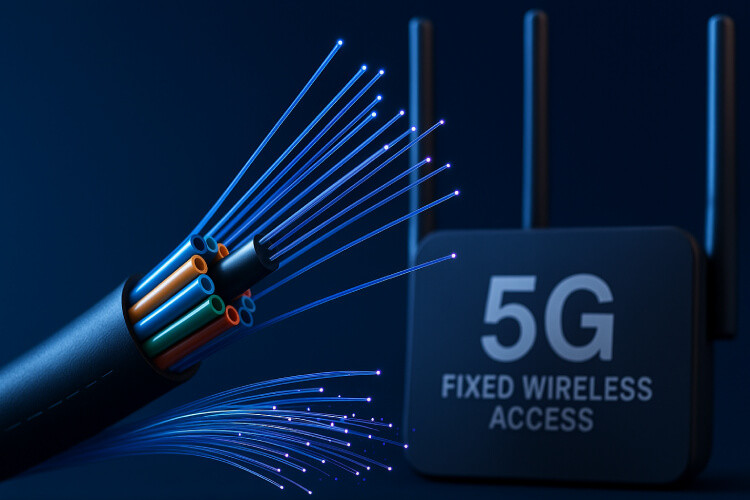4G, Fibre or Copper: UK Broadband Options for 2026
Insights | 31-05-2018 | By Christian Cawley

This article was updated in June 2025 (first published 31‑05‑2018 by Christian Cawley).
Key Takeaways:
- Analogue switch-off delayed: BT’s copper-based PSTN will now close on 31 January 2027, giving tele-care services extra time to migrate.
- Fibre accelerating: Full-fibre (FTTP) already reaches ≈ 74 % of UK premises and is on track for ≈ 95 % by 2030 thanks to Project Gigabit and “stop-sell” exchanges.
- 5 G fills the gaps: Outdoor 5 G now covers ~80 % of the UK land-mass; fixed-wireless routers routinely deliver 150-300 Mb s-¹, with gigabit peaks in strong cells.
- Spectrum of options: Rural sites can mix technologies—voucher-funded FTTP where viable, 5 G FWA for rapid installs, and LEO satellite (Starlink / OneWeb) for the last 3-5 % still beyond fibre.
It’s largely recognised that copper has had its day as a communications medium. Where once it was vital for telephonic connectivity, since the age of mass internet, its limits have become all too obvious.
Fortunately, there is no need to worry. Fibre broadband is marching across the UK, 4 G is now universal, and 5 G fixed‑wireless access is filling in the last gaps. Copper wires are barely needed these days; BT has already set a date for the switch‑off of analogue voice and the transition to IP telephony, now scheduled for 31 January 2027 after a two‑year extension to help tele‑care services migrate.
Within a few years, businesses across the UK will be using fibre broadband, vast volumes of data streaking through miles of fibre‑optic cable in the blink of an eye. But is the roll‑out of fibre being overtaken by 4 G – and its successor, 5 G?
Goodbye, Telephone Exchanges
Switching to fibre means BT will eventually close the public switched telephone network (PSTN). With the switch comes the closure of countless telephone exchanges, where miles of copper have been used since the mass adoption of telephones in the 1970s.
By 2027, BT aims for every UK customer to be upgraded from the old analogue service (in reality, part‑digital since the 1990s) to a wholly digital, all‑IP service. Copper is yesterday’s mass‑communication medium; fibre – and in some areas 5 G – is taking over. With the translation of every piece of communication and consumable media to data, voice becomes “just another app.”
Interestingly, the UK was once behind the game in migrating voice calls to IP. Germany and Sweden started first; today, virtually every EU incumbent has an IP target date, and the UK is merely tidying up the last endpoints.
The Fibre Rollout
Switching to fibre is good for everyone, businesses and grandparents alike. With an increasing amount of TV and movies enjoyed over the internet, domestic users are already lapping up higher speeds and bandwidth. Meanwhile, SMEs and corporations embrace improved communications between sites, with secure online collaboration, remote access, video calls, and more.
Then (2018): the fibre roll‑out had largely succeeded only in metropolitan and urban areas. Towns, villages, and remote properties missed out on fast internet for nearly two decades.
Now (2025): full‑fibre (FTTP) passes about 74 % of UK premises, according to Ofcom’s Spring 2025 update, and Government “Project Gigabit” contracts plus aggressive “stop‑sell” rules put the programme on track for ≈95 % by 2030. Community‑dig schemes like B4RN have pushed gigabit fibre into hamlets once stuck at 2 Mb s‑¹. Rural roll‑outs are finally more than press‑release promises – but they are still measured in years, not months.
Multi-mode optical fiber in an underground service pit By Bidgee - Own work, CC BY-SA 2.5 au, Link
Despite billions being pumped into broadband delivery, the last 3–5 % of premises – the truly hard‑to‑reach farms, lodges and lighthouses – still look unlikely to see fibre any time soon.
Where Mobile Internet Comes In
Anyone who has spent time in the Yorkshire Dales, the Brecon Beacons, or the Scottish Highlands will remember the frustration of weak signals. Things have improved: outdoor 4 G coverage is effectively universal, and 5 G now reaches roughly 80 % of the UK’s land mass from at least one operator.
Clearly, more masts were required, and they arrived. Church‑spire base stations, shared rural networks, and planning‑law tweaks have all helped. Alongside them, alternative technologies have matured: low‑Earth‑orbit (LEO) satellite broadband from Starlink and OneWeb, and voucher‑funded FTTP for the most isolated clusters.
Why Wait for 5 G?
Back in 2018, we wrote that “5 G internet will deliver anything above 1 000 Mb s‑¹, perhaps even 10 000 Mb s‑¹.” The real‑world numbers are lower but still impressive: typical UK 5 G users now see 150‑300 Mb s‑¹, while fixed‑wireless routers in good cells break the 1 Gb s‑¹ mark. Crucially, 5 G can be installed in a day, with no road‑digging.
With no expensive rural cabling, better flexibility, and respectable speeds, 5 G FWA – or LEO satellite – can be the answer in areas where fibre is still years away.
Time to Hold Out for 5 G… or Mix and Match?
While the British government pushes on with fibre, there’s no stopping it. Although you can refuse to connect, doing so rarely makes commercial sense unless geography leaves 5 G the only viable option.
It’s one of those frustrating facts of technology that a faster solution arrives soon after the upgrade completes. Fibre will reach some homes years after their neighbours have gigabit 5 G, but the smartest deployments use both: fibre (or leased lines) for low‑latency, guaranteed throughput; 5 G or satellite for rapid deployment, backup, and mobility.
Fibre may have arrived later than many hoped, yet it will remain the backbone for decades, with 5 G and its 6 G successor acting as agile overlays. The right mix – based on location, latency requirements, and budget – will deliver reliable connectivity for every household and business.
Read More: Data transmission boosted by (FSO) free space optics


